- Home
- Mordecai Richler
Joshua Then and Now Page 7
Joshua Then and Now Read online
Page 7
Parked outside the clubhouse, Joshua lighted a cigarette and counted nine other cars in the lot the next time lightning rocked the lake. Group grope, that’s what they were into. Westmount’s summer saturnalia. But the clubhouse was not in total darkness. Obviously, they had set out paraffin lamps here and there. Should I propel the Jeep right up the clubhouse stairs, bashing through the French doors? “Hey, remember the night that crazy Jew …”
Bolting up the clubhouse stairs, Joshua opened the front door softly, slipping quietly inside, fully expecting to trip over copulating couples. Gentile jogger nuts mounting Geritol-fed harridans. From the bar, he heard the sound of music and clapping hands. Somebody must have had a transistor radio. Or maybe a cassette player. But as his eyes adjusted to the dim light, he grasped that only Mr. Harry James was blowing. “The Four O’Clock Jump.” Everybody was gathered round the swirling couple. Yes, yes, the Mixed Doubles Champions, Eastern Quebec Region, 1952. The wrong side of forty, both of them, and jitterbugging. His wife, his brother-in-law. Even as Joshua stood there, feverishly jealous, he could see that his barefoot wife, her hair flying, her long legs flashing, looked simply splendid. He also had to allow that Peter Pan, Esquire, could certainly cut a rug, as they used to say. Oh how graceful he appeared!
Joshua slid behind the bar, which was unattended, and poured himself a walloping cognac. A voice came from behind, startling him. “Crack his nuts for him.”
It was Trimble, his ordnance corps tie askew, his little eyes floating in malice.
“You’re out of your gourd, Jack.”
“Don’t count on it, old son,” he said thickly.
Now, unfortunately, Joshua was cast in the light of one of the paraffin lamps and so his presence was no longer undetected, though Pauline was still unaware of it. And that’s when Kevin did the unforgivable. Something Joshua took for an act of defiance. What he did, catching sight of Joshua, was to twirl Pauline around so that she could receive, startled, the full benefit of his grim, disapproving face.
Impulsively, Joshua walked around to the other side of the bar and clicked off the cassette player. Silence. Consternation. Rabbi Shapiro has pronounced. No more cakes, no more ale.
Pauline, never one to be caught off balance in any social situation, strode into his arms, hugged him, and said, “I knew you’d come to pick me up.”
Moist hair stuck to the back of her neck. “I began to worry once the power went,” he said.
Kevin joined them, his smile revealing dimples Joshua had not noticed before. “Now that you’ve finally honored us with your presence,” he said, “I’m not going to let you go until you sign that book for me.”
Joshua eased Pauline back from the bar so that there was nobody between him and Kevin. Remember: stick, stick, and away you go. “I was just saying to Pauline that you not only play boy’s –” it nearly came out “goy’s” – “games surpassingly well, but you also dance divinely.”
“Joshua, please.”
Jane Trimble sashayed up to the bar, glistening with excitement. Tim Hickey, the McTeers, and a few more, equally sodden, were now also drawn to the bar, anticipating an incident. Only Dickie Abbott, whom Joshua liked, was intent on keeping the peace. “Good to see you, Joshua,” he said.
But Joshua ignored him. He picked off a strand of honey-colored hair from Kevin’s shoulder. “Hey,” he said, “now I know where I’ve seen you before. Didn’t you model underwear for Esquire’s nineteen-fifty-five back-to-college issue?”
“Oh, shit, let’s go home.”
“My wife wants to go home, but I haven’t finished my drink yet.”
“That wasn’t me,” Kevin said, seemingly not the least offended, “but you could have seen me in Thunderball. You know, the Bond film.”
“Holy cow. Were you really in that?”
“I was one of the scuba divers.”
“There is absolutely no reason for you to be angry,” Pauline said, thrusting herself against him.
“I’m not angry.”
“We’re going to be friends,” Kevin said reassuringly.
Trimble, disgusted, retreated from the bar, but not Jane. The rain had settled into a soft, steady drizzle. First one couple and then another moved off. Maybe there wasn’t going to be a fight after all. “Don’t tell me the party’s ending just when I get here,” Joshua complained.
“It’s not ending,” Jane said, her voice soft and sympathetic, “we were just waiting for the rain to ease up before going in for a skinny-dip.”
Joshua went rigid. “My wife,” he said, “doesn’t skinny-dip with anybody but me.”
“Would you please stop calling me ‘my wife.’ I do have a name.”
“I beg your pardon. Mrs. Shapiro doesn’t skinny-dip with anybody but me.”
“It’s just something we used to do together when we were kids,” Kevin said. “It’s innocent, it doesn’t mean a thing.”
Remembering what his father had taught him about bar brawls, Joshua didn’t intend to jab, he was going to let go a short fast one. But it was Pauline’s face. Weaker. The eyes inclined to waver. But her face. He couldn’t bring himself to strike it.
“You’re looking at one of your admirers,” Kevin was pleading, his smile enchanting. “Really you are. She wanted to leave long ago. I kept her here.”
“We’re leaving right now,” Pauline said, taking his arm.
They drove in silence until they reached the main road.
“Would you have gone skinny-dipping with them if I hadn’t turned up?”
“When we were kids, Kevin and I used to be tossed into the same bathtub here every night.”
“But you’re not kids any more, and you haven’t answered my question.”
“No, I guess not.”
“Why?”
“Because you wouldn’t have liked it, I’m forty-two years old, I’ve had three kids, and my breasts aren’t what they once were.”
“I wonder what I could get for you as a trade-in.”
Back at the cottage, they found a bottle of Chablis in the fridge and drank it together on the dock, their feet dangling in the water.
“I don’t want to grow any older,” she said.
But he wasn’t listening.
“Josh?”
“I want to go back to Spain,” he announced out of nowhere.
“What are you talking about?”
“Ibiza.”
“Why?”
“Because I behaved badly there once.”
“Oh, come now. You didn’t behave that badly. And that, as they say, was long ago and in another country. There’s nothing you can do about it now.”
“I could find out what happened to everybody after I fled.”
“Forget it.”
“What if I can’t?”
“I don’t really think you care that much about Spain any more. Or what happened to everybody on Ibiza. I think there’s just a part of you that craves to be twenty-one again.”
“You don’t understand. I hated being twenty-one.”
“Then, maybe, but not now.”
Pauline scribbled a note for the children, left it on the kitchen table, and they retreated to their bedroom, Joshua collapsing gratefully on the bed, letting his clothes fall anywhere. But then the sight of Pauline, in the flimsiest of bras and pink satin half-slip, struck him as so provocative, even after all their years together, that he now felt more aroused than weary. He pulled her down to the bed with him. It didn’t work. Pauline felt as if she were being rather brusquely reclaimed, a territory of doubtful ownership, and she was not pleased. And Joshua, finding her unresponsive, was resentful. He slept badly. He dreamed about Ibiza again. Mueller. Monique. Mariano.
They didn’t come out of their bedroom again until early afternoon. Pauline made scrambled eggs and coffee and carried it out to the porch overlooking the lake.
“His seaplane’s still docked at the club,” Joshua said.
“I should hope so. He hasn’t even said goodbye yet.�
��
Fumbling for his binoculars, scanning the bay, Joshua soon added, “Wait. Further intelligence. Guess who’s taken him out water-skiing?”
“Jane Trimble.”
“Why yes,” he replied, impressed, “you’re right. And wait for it. The Grew’s headed right for our dock. I think we are about to have guesties.”
But, at the last moment, the Grew, its nose prodding the air, veered sharply away.
3
NINETEEN THIRTY-NINE, A BAD TIME FOR MOST, WAS a vintage year for the Shapiros. Joshua’s father, after an absence of two years – an absence that was not satisfactorily explained to him – was living at home again, laboring in the family scrap yard. Joshua was only eight years old, and he had no idea why his father had to work for Uncle Oscar; neither did he suspect how much he hated it. Reuben Shapiro was not the most forthcoming of men.
“Daddy, weren’t you in the liquor business once? Before I was born?”
“Yeah, well. Right.”
“What did you do?”
“You could say I was in deliveries, sort of.”
Although they lived in Montreal, his father used to bring home the New York newspapers after his long days in the junkyard, the pages stained with chopped egg and onion, hasty notations on the morning line at Belmont scrawled in the margins. The News, the Mirror. And always something for Joshua. Action Comics, an Oh Henry bar, or, if one of his horses had come in, a model airplane kit. Once a week his father also brought home Life magazine. Lying on the living room carpet one evening in the spring of 1939, idly flipping the pages, Joshua came on a picture of Franco leading his troops into a stricken Madrid. Franco triumphant, ending a siege that had begun more than two years earlier, on November 6, 1936.
Their massive, walnut-finished radio was tuned to “Fibber McGee and Molly.” Uncle Oscar, visiting with them, pronouncing over a Johnson’s Wax commercial, assured his father that aluminum, aluminum was the stuff, it was going to be needed for airplanes, but, he cautioned, even if war came the Germans were bound to collapse after six months. The Maginot Line was impregnable. Take it from me, Ruby.
His father bobbed his head, agreeing, rather than argue with Uncle Oscar, who considered himself the ultimate authority on all matters. He knew, for instance, that GM had developed an engine that could run for sixty miles on an eyedropper full of paraffin, but the oil interests had had it suppressed. He was also aware that Hitler was down to two doubles, the third having already been assassinated. Hardly a baseball fan, he was still able to assure Joshua that Hank Greenberg wore a special steel jockstrap, because when he slid into second base they tried to tag him you-know-where, the bastards, just because he was born a Hebe. “And hey there, Denny Dimwit, if you were my son you wouldn’t sit there with your head buried in the sports pages.”
“He’s not your son,” his father said.
“Sports is for dummies. Look where it got your dad.”
Joshua, bright-eyed, turned expectantly to his father. Hit him. Smash him one, please. But all his father said was, “Yeah, well. Right.”
Reuben watched his son, his only son, flee the living room.
Uncle Oscar, the most wintry of men, knew only one mood: outrage. Outrage against the stacked deck this world had dealt him. Busted flushes. Heartburn. Bunions. Blocked sinuses. Constipation. Foul-tempered, constantly on the boil, he would stomp through his yard, urging on the men as they sledge-hammered brass bedsteads, worth twenty-five cents a pound, smashed Franklin stoves for the cast iron, cannibalized twenty-year-old Gray-Dort sport roadsters and Frontenac coupes, anything those crazy farmers brought in, realizing only a frustratingly small profit after the metals had been separated. He trekked through his shit-pile of spittoons, prehistoric sewing machines, ridiculous old barber chairs, marble sinks that were being gutted to get at the brass taps, scales and other fixtures from country general stores equipped during the ice age, everybody’s dreck dumped on him, wracking his head for the money-making idea that would lift him out of his dreaded yard and into Outremont with all its splendors.
Once, summoned by his jangling phone, Reuben stumbled into the hall in the early morning hours only to have Oscar bellow at him, “Advertising on hotel ceilings.”
“What?”
“There’s all this wasted space, see? A drummer checks in, he’s lonely, he lies down on the bed, and there it is on the ceiling for him. Restaurants, nightclubs, strip joints, lists of movies. Everything all laid out. What do you think?”
Though younger than his father, Uncle Oscar wore a business suit and held forth in the scrap yard office. This was no more than a glorified shack, but he was behind a desk all the same, sucking on a House of Lords, ruminating over penny mining stocks, while his father drove the truck or spun out his days wading through the muck of the small yard with the French Canadians, sorting out metals. A dandy born, Reuben came home dirty as a miner to be served supper by his watchful wife.
“It’s only another fourteen months there, Ruby, and then you’ll be free to leave.”
“Yeah, well. Right.”
Afterwards his father usually settled into his easy chair, nodding off over a copy of Black Mask or, if it was a Friday night, calling him in to listen to the fights, Don Dunphy reaching out to them through their walnut-finished RCA radio. Whenever any of Colucci’s people came to call, his mother filled the doorway, hands on her hips, and said he was out.
Joshua’s father drove home in the truck. But Uncle Oscar, who had graduated from Commercial High, owned a car, he was on the executive of the synagogue and played golf with gentile customers from time to time, if only on a municipal course. “Hey, Heeney, what if you could defrost the St. Lawrence in January, keeping the harbor open all year round?”
Boy, these Jews. Clever. “How?” Heeney asked.
“Warming it with underwater cables.”
Uncle Oscar was taking a correspondence course in engineering, he kept a set of the Encyclopedia Britannica in a glass-enclosed case in his living room. When things were slack in the yard, he composed letters to the editor of the Star on world conditions, the possibility of life on Mars, and the plight of the Jews in Europe. Once he had conceived a new form of crossword puzzle, but couldn’t get anywhere in New York, no syndicate would handle it. Of course not, he was merely a Canadian. He hurried to Ottawa to offer his war plan to the Ministry of Defence, unavailingly. He invented one ingenious radio game after another, and took his ideas to Toronto, but would the CBC buy from a Jew? No. But in 1940 he was still in there. Scheming, fulminating. “What if you could get off the train in Washington,” Joshua once heard him speculate, “walk right into a government office, and patent the fucking alphabet. Imagine, only twenty-one letters, but they’d have to be worth a fortune.”
One afternoon when Joshua had just turned ten, the secretary in the scrap yard’s outer office, a neighborhood girl, was home sick. Joshua happened to be hanging around, out of school, and was enormously flattered to be asked to take care of the phone calls. Handling the first one, he said, “One moment, please,” and turned the receiver over to his father. “Yes,” his father said, nodding, apologizing to the caller, and passed the receiver to Uncle Oscar. Uncle Oscar talked at some length as usual – going into the only proper method for curing tobacco, and how only a few important people knew that Mussolini was suffering from the syph – before he got to the price of zinc. When he finally hung up, he turned to Joshua, his eyes taunting. “Who did they ask for?”
“Mr. Shapiro,” Joshua replied hotly.
“If they ask for Mr. Shapiro in this office, it’s for me. If they want to speak to your father, they ask, ‘Is Ruby around?’ ”
His father, the scar tissue round his eyebrows drained white, didn’t say a word.
“Fuck you, Uncle Oscar.”
Uncle Oscar whacked him one. His father, springing with a speed that terrified Joshua, lunged at Uncle Oscar, driving him against the wall.
“Don’t, Ruby. For your sake,” he pleaded, even a
s he sank to floor, whimpering.
His father backed away from him, striding out of the office without a word. Uncle Oscar removed his steel-rimmed spectacles and wiped his eyes. He stood up, dusting off his trousers, and turned to Joshua. “You’re nothing but a little fart,” he said, “and if he walks off this job, it’s you who are to blame, not me. Now get the hell out of here, Denny Dimwit,” he added, already dialing his mother’s number on the phone.
To Joshua’s astonishment, his mother didn’t reproach him when he got home. Neither was his father’s truck parked outside. Ignoring him, his mother waited by the window. His father didn’t come back for supper, he didn’t return until long after Joshua had gone to bed, and the next morning, when he got up to get ready for school, Joshua was surprised to discover that his father was still at home. Furthermore, he wasn’t dressed in the work-clothes that smelled sharply of axle grease. Reuben was wearing his Adam hat, a white-on-white shirt, a hand-painted tie, a checked sports jacket, neatly creased brown trousers, diamond socks, and patent leather shoes.
“I’m sorry if I did something wrong,” Joshua said.
“You did me a favor,” his father said.
“Some favor,” his mother said, glowering at Joshua. “This means the end of his parole.”
Joshua didn’t yet know what “parole” meant, but he didn’t dare ask.
“Don’t worry,” his father said, “Colucci is taking care of everything.”

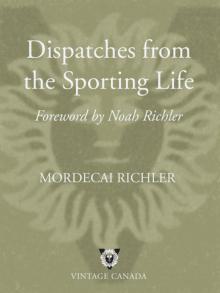 Dispatches From the Sporting Life
Dispatches From the Sporting Life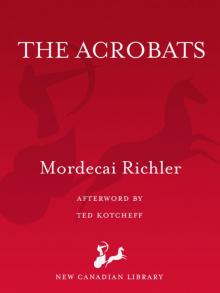 The Acrobats
The Acrobats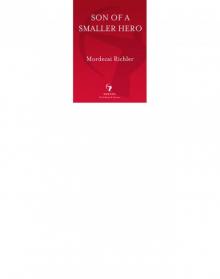 Son of a Smaller Hero
Son of a Smaller Hero Jacob Two-Two-'S First Spy Case
Jacob Two-Two-'S First Spy Case Jacob Two-Two Meets the Hooded Fang
Jacob Two-Two Meets the Hooded Fang Jacob Two-Two and the Dinosaur
Jacob Two-Two and the Dinosaur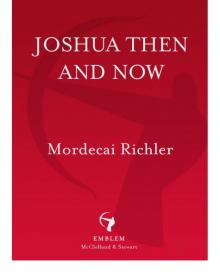 Joshua Then and Now
Joshua Then and Now Solomon Gursky Was Here
Solomon Gursky Was Here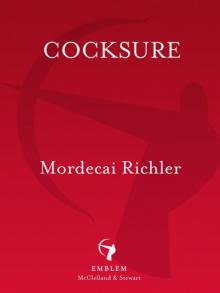 Cocksure
Cocksure The Street
The Street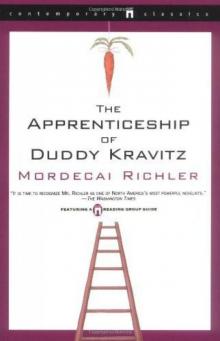 The Apprenticeship of Duddy Kravitz
The Apprenticeship of Duddy Kravitz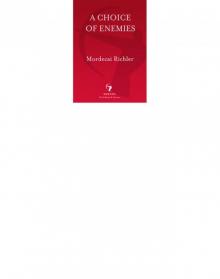 A Choice of Enemies
A Choice of Enemies Barney's Version (Movie Tie-In Edition)
Barney's Version (Movie Tie-In Edition)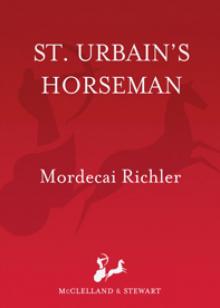 St. Urbain's Horseman
St. Urbain's Horseman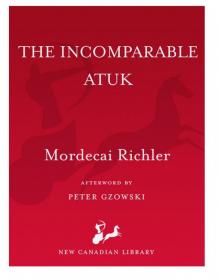 The Incomparable Atuk
The Incomparable Atuk Barney's Version
Barney's Version